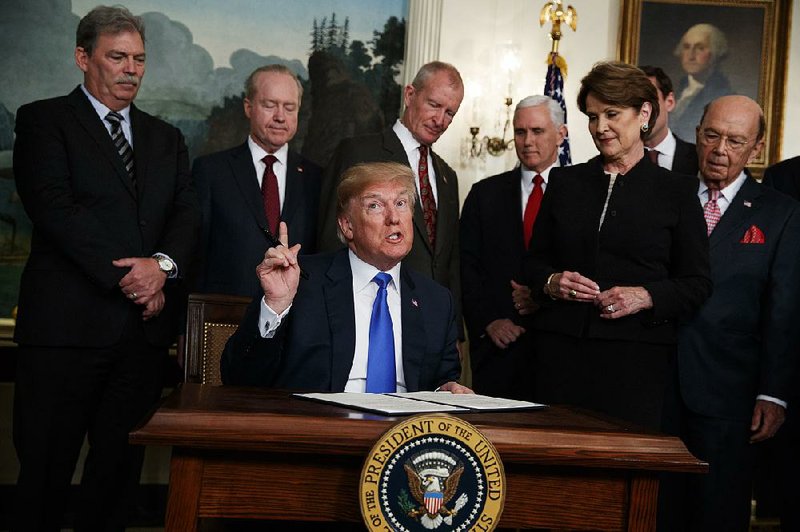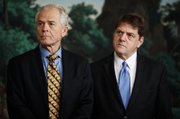President Donald Trump said Thursday that he would impose about $60 billion worth of annual tariffs on Chinese imports as the White House moved to punish China for what it says is a pattern of co-opting U.S. technology and trade secrets, and robbing companies of jobs and billions of dollars in revenue.
The measures come as the White House grants a long list of exemptions to U.S. allies from steel and aluminum tariffs that go into effect today. Among exemptions is the European Union, which has lobbied aggressively and publicly for relief from the trade action.
"The word that I want to use is reciprocal," Trump said in announcing the tariffs in the diplomatic room of the White House. "If they charge us, we charge them the same thing."
The China tariffs are his strongest trade action yet against a country he has branded an "economic enemy." They fulfill one of his core campaign pledges, to demand more reciprocal deals with trading partners around the world.
But coupled with the administration's decision to exempt the European Union, South Korea, Brazil, Canada and Mexico from the tariffs on cheap metals, the action demonstrates how much Trump's nationalist trade agenda is really targeted at a single country: China.
"What the United States is doing is strategically defending itself from China's economic aggression," said Peter Navarro, director of the White House National Trade Council and an architect of the measures. "We repeatedly aired our concerns about China as a nonmarket economy."
Today, China announced a list of U.S. goods -- including pork, apples and steel pipe -- that it said may be hit with higher import duties in response to Trump's tariff increase on steel and aluminum.
The Commerce Ministry called on Washington to negotiate a settlement as soon as possible but set no deadline. In a statement, it said the higher U.S. tariffs "seriously undermine" the global trading system.
The prospect of growing trade tensions between the world's two largest economies spooked global financial markets. The Dow Jones industrial average closed down 2.9 percent at 23,957.89 on Thursday. The Nasdaq composite and the Standard & Poor's 500 index also nose-dived.
The tariffs, which the U.S. trade representative will publish within 15 days, will target 1,300 lines of Chinese goods -- everything from shoes and clothing to electronics, administration officials said.
Trump, the officials said, will also direct the Treasury Department to impose restrictions on Chinese investment in U.S. technology companies -- a practice that they said the Chinese government uses to develop its own "national champions" in cutting-edge industries such as artificial intelligence and autonomous vehicles.
Robert Lighthizer, the U.S. trade representative, told the Senate Finance Committee on Thursday that he had recommended that the forthcoming actions against China include tariffs on Chinese products from all of the advanced industries the country has vowed to build up as part of its "Made in China 2025" plan. Those industries include electric vehicles, high-tech shipping and aerospace technology. Lighthizer called them "the ones I care about" for tariff purposes.
"The end objective of this is to get China to modify its unfair trade practices," Everett Eissenstat, deputy director of the National Economic Council, said in a telephone call with reporters.
Navarro cast the tariffs as part of a seminal shift in how the United States views China. Rather than trying to draw it into the rules-based international economic order -- a policy that dates back to Richard M. Nixon and Henry Kissinger -- the United States now regards China as a strategic competitor, bent on eroding U.S. security and prosperity.
[PRESIDENT TRUMP: Timeline, appointments, executive orders + guide to actions in first year]
From toys to clothes to shoes to cellphones, Americans buy a half-trillion dollars' worth of goods from China each year -- the biggest haul of imports from any one country.
White House officials say they will try to minimize any price increases for American shoppers. Instead, they suggested Thursday that the tariffs would mostly target products that businesses, rather than consumers, buy: computers, information technology products, industrial machinery and aircraft parts.
"If they had done it on clothing, footwear and iPhones, that would have more of an immediate impact," said Chad Bown, a senior fellow at the Peterson Institute for International Economics. "That doesn't seem like what they're doing here."
Analysts note, though, that many businesses would eventually pass on any higher import costs to consumers in the form of higher prices.
Most modern appliances include electrical components from China. Semiconductors and transistors run the touch-screen panels and beeping alarms in refrigerators, washing machines and dishwashers. Cars also include high-tech components.
"If they put the tariff on things that you can't see, then consumers may say, 'They're not putting a tariff on my Ford Escort, or my Maytag refrigerator,' but they are," said Robert Atkinson, president of the Information Technology and Innovation Foundation, a trade association.
The countries getting exemptions from the steel metals tariffs account for more than half of the $29 billion in steel sold to the United States in 2017. That could make the tariffs less helpful to domestic steel mills.
One trading partner and ally was prominently missing from the list: Japan, which sent about $1.7 billion in steel mill products to the United States last year, according to IHS Markit Global Trade Atlas. Without an exclusion, it will be the only one of the top six foreign suppliers of steel to the United States to face steep tariffs.
Tadaaki Yamaguchi, chairman of the Japan Steel Information Center, a New York-based trade group, said failing to give Japan the same exemption that was extended to South Korea and Brazil was "an outrage and a travesty."
But the moves come at a time when Trump has enlisted President Xi Jinping of China to help pressure North Korea over its nuclear and ballistic missile programs. Last year, Trump said he had decided not to designate China as a currency manipulator, in part because China was cooperating in the pressure campaign.
Trump's explicit linkage of trade and security raises questions about whether the tensions from these tariffs will spill over into the North Korea issue.
Information for this article was contributed by Jim Tankersley and Jack Ewing of The New York Times; by Christopher Rugaber and other staff members of The Associated Press; and by staff members of Bloomberg News.
RELATED ARTICLE
http://www.arkansas…">Fears of trade war clobber stocks
A Section on 03/23/2018

